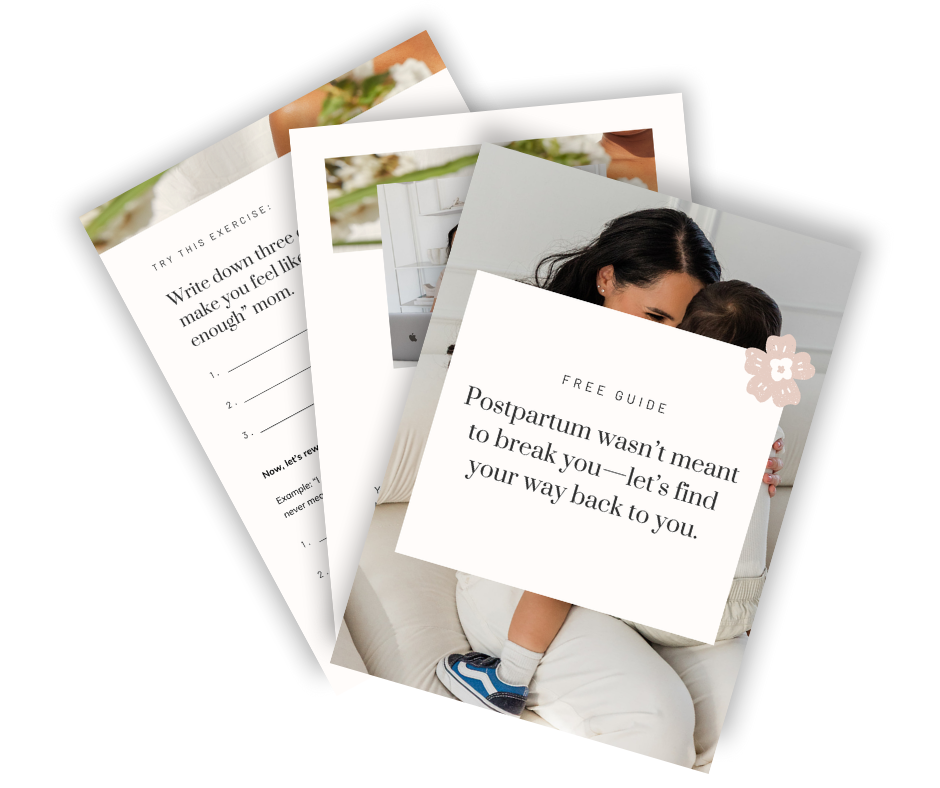Pregnancy therapy in Los Angeles
Many expectant mothers feel pressure to embrace every moment of pregnancy with joy. But the truth is, pregnancy is an emotional journey filled with ups, downs, and unexpected challenges. Therapy provides a space to process your emotions, ease your fears, and prepare for motherhood in a way that feels safe and empowering.
In case you are new here, I’m Karla Hernandez, a maternal mental health therapist specializing in pregnancy therapy in Los Angeles. If you are struggling with anxiety, mood swings, or emotional distress during pregnancy, you are not alone—and you deserve support.
What is pregnancy therapy?
Pregnancy therapy is a space where you can be honest about how you’re feeling—without guilt, judgment, or pressure to “just enjoy every moment.”
Whether you’re dealing with mood swings, pregnancy-related anxiety, or fears about birth and postpartum, therapy helps you:
- Manage anxiety and stress related to labor, delivery, and new motherhood
- Navigate the emotional and identity shifts of pregnancy
- Heal from past losses, fertility struggles, or traumatic births
- Prepare mentally and emotionally for postpartum
- Feel more supported and connected to your pregnancy journey
You don’t have to carry these emotions alone. Therapy can provide relief, validation, and tools to help you feel more at peace during pregnancy.
Most common symptoms of pregnancy-related emotional distress
If you are struggling emotionally during pregnancy, you may experience:
- Constant worry or intrusive thoughts about birth, labor, or becoming a mother
- Mood swings, irritability, or feeling emotionally drained
- Guilt for not feeling “excited enough” about pregnancy
- Feeling disconnected from your pregnancy, your body, or your baby
- Resurfacing emotions from past pregnancy losses or birth trauma
- Fear that your relationship with your partner will change
- Struggles with setting boundaries with family or medical providers
If any of this feels familiar, therapy can help you navigate these emotions in a way that feels supportive and empowering.
How do I know if I have pregnancy-related anxiety or emotional distress?
If you are unsure whether therapy could help, ask yourself:
- Do I constantly feel anxious, worried, or overwhelmed about my pregnancy or birth?
- Am I experiencing racing thoughts or worst-case-scenario fears that won’t go away?
- Have I noticed increased sadness, irritability, or frequent mood swings?
- Am I feeling disconnected from my body, baby, or sense of self?
- Do I feel pressure to “do everything right” and guilt when I don’t?
- Am I struggling with past losses, infertility trauma, or previous birth experiences?
If you answered yes to any of these, pregnancy therapy can provide the support, clarity, and emotional tools you need to feel more at ease.
How I treat pregnancy-related emotional distress in Los Angeles
My approach to pregnancy therapy in Los Angeles is based on trauma-informed, compassionate, and evidence-based care. Every mother’s experience is unique, and therapy is tailored to your specific needs.
Some areas we may focus on include:
- Reprocessing the traumatic event with Cognitive Processing Therapy (CPT)
- Using somatic techniques to regulate your nervous system
- Validating emotions like anger, guilt, grief, or fear
- Identifying triggers and learning how to respond to them
- Rebuilding your sense of safety, agency, and self-worth
I use a combination of:
- Cognitive Behavioral Therapy (CBT) to manage anxious thoughts and emotions
- Mindfulness and relaxation techniques to regulate stress
- Self-compassion and boundary-setting strategies to reduce guilt and pressure
- Guided emotional preparation for postpartum to ease the transition into motherhood
Therapy is not about eliminating worries entirely—it’s about helping you navigate them with greater clarity and confidence.
What topics can we talk about in therapy for pregnancy?
Every mother’s experience is different, but some common areas we can explore in therapy include:
- Managing pregnancy-related anxiety, stress, and mood changes
- Processing unexpected emotions, fears, or guilt
- Healing from past pregnancy loss, fertility challenges, or birth trauma
- Navigating changing relationships and partner communication
- Emotionally preparing for postpartum and the identity shift into motherhood
Therapy is a space where you can speak openly, process emotions, and find the support you need.
Ready to get started?
Book a consultation call
No pressure, no judgment—just a space to share what you’re going through and see if this support feels right for you.
Let’s meet where you are
Whether you’re running on no sleep, feeling stuck in survival mode, or just need someone to validate how hard this is, we’ll start from exactly where you are.
Start healing and thriving in your motherhood
With the right support, you can release the guilt, find balance, and reconnect with yourself—because you deserve to feel whole, not just needed.
Pregnancy therapy specialist in Los Angeles
Pregnancy therapy specialist in Los Angeles

I specialize in pregnancy therapy in Los Angeles, helping expectant mothers process the emotional shifts that come with pregnancy. My goal is to help you feel more supported, validated, and emotionally prepared for the journey ahead.
Pregnancy is not just about growing a baby—it’s about growing into motherhood, and that process deserves care and attention too.
Tips & resources for coping with pregnancy-related emotional distress
- Practice grounding techniques like deep breathing or body scanning to manage stress
- Set boundaries around advice and expectations—your pregnancy, your rules
- Build a supportive birth team that respects your choices and mental health needs
- Join a pregnancy support group to connect with other expectant mothers
- Prioritize basic self-care—nourishing meals, gentle movement, and meaningful rest
If you are struggling, seeking therapy is not a sign of weakness—it’s an act of self-care for both you and your baby.

Hello! I'm Karla Hernández
LCSW perinatal and postpartum therapist serving women in Los Angeles and surrounding areas
I help new moms in Los Angeles navigate postpartum anxiety, depression, and the emotional shifts of motherhood. After experiencing my own struggles, I saw how much real support is missing for mothers. My practice is here to change that—offering trauma-informed, compassionate care that meets you exactly where you are. You don’t have to do this alone.

Book your therapy during pregnancy in Los Angeles,CA
- Intake (50 to 60 minutes) $200
- 50 minute individual therapy sessions are $200
- I accept Aetna and Cigna insurance
- Additionally I partner with Mentaya, who may help you get reimbursed for your therapy sessions through out of network benefits (I have a link to check benefits instantly to see if you qualify)
FAQ
Is therapy good during pregnancy?
Yes, therapy can be incredibly beneficial during pregnancy. It provides emotional support, coping strategies, and a safe space to process fears, anxiety, or unexpected emotions.
Why am I so anxious about being pregnant?
Many factors contribute to pregnancy anxiety, including hormonal changes, fear of the unknown, past experiences, or pressure to "do everything right." Therapy can help you manage these feelings in a way that feels supportive and validating.
What is the best treatment for pregnancy-related anxiety, stress, and mood changes?
The best treatment depends on your needs. Many mothers find relief through Cognitive Behavioral Therapy (CBT), mindfulness, and emotional processing work to address anxiety and mood shifts during pregnancy.
Is it normal to feel disconnected from my pregnancy?
Yes, many mothers experience this, especially if they are struggling emotionally, have experienced past trauma, or are feeling overwhelmed. Therapy can help you explore these feelings and build a stronger connection.
How can I improve my mental health during pregnancy?
Improving mental health during pregnancy includes setting boundaries, practicing self-compassion, getting professional support, and surrounding yourself with people who respect your emotional needs.